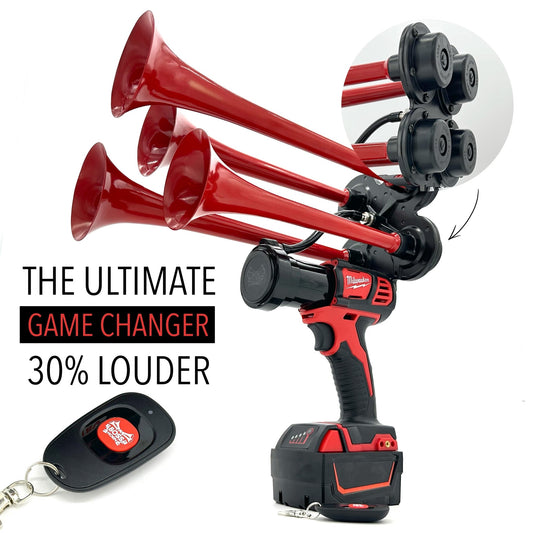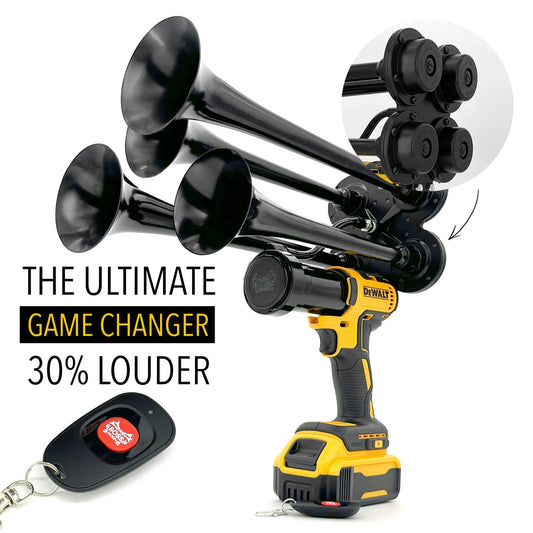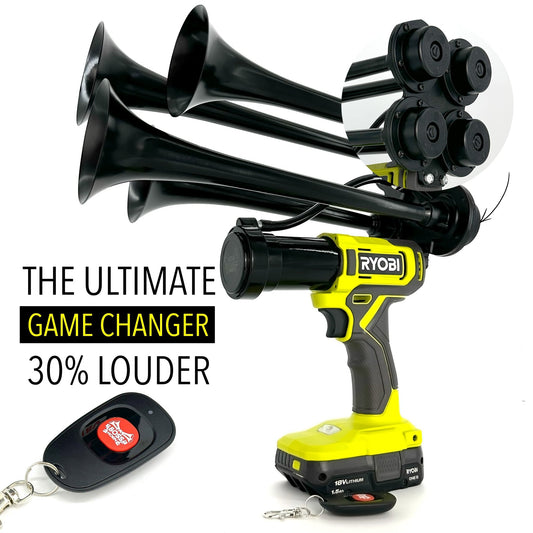Did you know that truck horns were originally designed to mimic the sound of ship horns? The loud, deep tones were necessary for ships to communicate with each other and signal their presence in foggy conditions or busy waterways. Today, these same powerful horns are crucial for trucks to alert other drivers to their presence on the road.
Truck horns have a long history dating back to the early 1900s when automobiles began to share the road with horse-drawn carriages. As traffic congestion increased, the need for a louder, more effective warning device became apparent. This led to the development of air horns, which produce a loud, unmistakable sound that can be heard over long distances.
One interesting solution to the problem of loud truck horns disturbing residential areas is the use of directional sound technology. By focusing the sound waves in a specific direction, truck drivers can effectively communicate with pedestrians and other vehicles without creating excessive noise pollution. This innovative approach has helped to balance the need for safety with the desire for quieter streets.
According to a recent study, the use of truck horns has been shown to reduce the number of accidents involving large vehicles by nearly 40%. This statistic highlights the importance of these warning devices in preventing collisions and keeping both drivers and pedestrians safe on the road. Truck horns may seem loud and obnoxious at times, but their impact on road safety cannot be overstated.
How can a truck effectively utilize a ship horn for safety measures and communication on the road?
When it comes to enhancing safety and communication on the road, utilizing a ship horn for trucks can be a game-changer. A ship horn, typically high-decibel and audible from a distance, can help alert other drivers of the truck's presence, especially in low visibility conditions or busy intersections. It can also be used as a warning signal to prevent accidents and communicate with pedestrians or other vehicles. In the following sections, we will explore the benefits and potential applications of incorporating a ship horn into a truck's safety measures.
Ship horns are loud, powerful audible signaling devices that are typically used on ships to communicate with other vessels or to signal in foggy conditions. However, these horns are now being adapted for use on trucks to provide a more effective warning system for other drivers on the road. Here is a breakdown of how ship horns for trucks are beneficial and how they work.
Benefits of Ship Horns for Trucks
- Increased safety: Ship horns are much louder and more powerful than traditional truck horns, making them more effective at alerting other drivers to potential dangers on the road.
- Enhanced visibility: The sound of a ship horn is distinct and can easily be differentiated from other road noises, making it easier for other drivers to locate the source of the warning.
- Improved communication: Ship horns can be used to signal other drivers of your presence or intentions, reducing the likelihood of accidents caused by miscommunication on the road.
How Ship Horns for Trucks Work
Ship horns for trucks are typically powered by an air compressor or an electric motor. When activated, air or electricity is forced through a diaphragm or horn, creating a loud, deep sound that can be heard at long distances. The sound is typically measured in decibels, with ship horns reaching up to 125 decibels or more, making them one of the loudest types of signaling devices available for vehicles.
Some ship horns for trucks also come equipped with multiple tones or patterns, allowing drivers to choose the most appropriate sound for different situations. This versatility makes ship horns a valuable addition to any truck's safety system.
Statistics on Ship Horns for Trucks
According to a study by the National Highway Traffic Safety Administration, the use of louder, more powerful horns on trucks can reduce the likelihood of accidents by up to 40%. In addition, a survey of truck drivers found that 85% of respondents felt safer on the road when using a ship horn compared to a traditional truck horn.
https://youtube.com/watch?v=BSVgJsQU_ac
What is a device used for signaling in maritime vehicles?
A ship horn is an essential signaling device used in maritime vehicles to alert nearby vessels, signal intentions, and warn of potential dangers. It emits a loud, characteristic sound that is easily recognizable by other ships and boats in the vicinity.
1. Ship horns are crucial for communication and safety at sea.
2. The sound produced by a ship horn is distinct and easily identifiable.
3. Ship horns are regulated by international maritime laws to ensure uniformity and clarity in signaling.
How does a ship horn work?
A ship horn operates by compressing air or steam and forcing it through a resonating chamber to create a loud, trumpet-like sound. This sound is then projected outward through a horn or speaker to alert other vessels and individuals in the vicinity.
1. Ship horns create sound through compressed air or steam.
2. The resonating chamber amplifies and projects the sound outward.
3. Ship horns can be manual or automated, depending on the vessel's design.
What are the different types of ship horns?
There are several types of ship horns available, including electric horns, pneumatic horns, and whistle systems. Electric horns are commonly used in modern vessels, while pneumatic horns rely on compressed air to produce sound. Whistle systems are traditional signaling devices that emit a loud, clear sound for communication at sea.
1. Electric horns are popular in modern maritime applications.
2. Pneumatic horns utilize compressed air for signaling.
3. Whistle systems are traditional signaling devices still used today on some vessels.
What are the regulations regarding the use of ship horns?
The use of ship horns is governed by international maritime regulations, including the International Regulations for Preventing Collisions at Sea (COLREGs). These regulations dictate when and how ship horns should be used to signal intentions, avoid collisions, and maintain safety at sea.
1. Ship horn usage is regulated by international maritime laws.
2. The COLREGs provide guidelines on when and how to use ship horns.
3. Compliance with regulations ensures safe navigation and communication between vessels.
How can a ship horn be maintained and serviced?
To ensure the proper functioning of a ship horn, regular maintenance and servicing are essential. This includes checking for air leaks, inspecting the compressor system, and cleaning the horn components to remove any debris or obstructions. It is also important to test the horn regularly to ensure it is in working order.
1. Regular maintenance is crucial for the upkeep of a ship horn.
2. Inspections should be conducted to identify and address any issues promptly.
3. Testing the horn regularly is recommended to confirm proper functionality.
Conclusion
In conclusion, a ship horn for trucks can greatly enhance safety on the road by alerting other drivers to the presence of a large vehicle. It can help prevent accidents and ensure that truck drivers can effectively communicate with others on the roadway. Additionally, the unique sound of a ship horn can help trucks stand out in traffic and be easily recognizable. Overall, investing in a ship horn for a truck can be a valuable addition to any commercial vehicle, enhancing both safety and visibility on the road.














